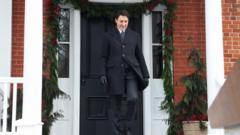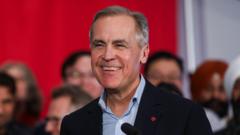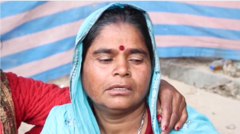Canada bids farewell to Prime Minister Justin Trudeau, who has announced his resignation after years of facing declining support, internal party conflict, and various scandals. His leadership, once celebrated for progressive policies, has increasingly become a source of frustration, leading to a crucial political shift.
Trudeau's Departure Marks the End of an Era in Canadian Politics

Trudeau's Departure Marks the End of an Era in Canadian Politics
Prime Minister Justin Trudeau resigns after nearly a decade amid party unrest and public dissatisfaction.
In the wake of growing discontent within his own party and a series of electoral setbacks, Canadian Prime Minister Justin Trudeau has announced his resignation after nearly a decade in power. The news comes after months of speculation regarding his future, particularly as political rivals gained traction in public opinion polls.
Standing outside Rideau Cottage, Trudeau acknowledged that in order for the Liberal Party to present a viable alternative in the next election, it was necessary for him to step back from leadership, stating, "This country deserves a real choice." While he will remain in office until a new leader is elected, the timeline for this transition has yet to be determined.
Trudeau's ascent began in 2015, when he captured the hearts of voters with his youthful energy and progressive promises, helping the Liberal Party transition from third place to majority status, a historic shift in Canadian politics. However, as of late, he finds himself the last of his contemporaries—leaders like Barack Obama and Angela Merkel have since exited their roles, leaving Trudeau as the longest-serving leader among the G7 countries at 53.
Despite achieving notable milestones in indigenous reconciliation and other policy areas, Trudeau’s tenure has been marred by controversies, including ethical breaches stemming from the SNC-Lavalin affair and other scandals. These incidents eroded public confidence and heightened scrutiny, especially as his government struggled with pressing issues like inflation and immigration management.
Political journalist Paul Wells reflects on Trudeau’s leadership, noting that while he will be seen as a consequential figure, he increasingly alienated himself from public sentiment, failing to adapt in an evolving political landscape. Trudeau’s accomplishments during the pandemic and notable policy enactments have not been enough to overshadow growing dissatisfaction with his administration.
The Liberal Party’s recent performances in special elections signal a troubling trend, with increased calls within the party for a leadership change. Polls indicate that, if elections were to be held presently, the Conservatives, led by Pierre Poilievre, would stand in a strong position to claim victory—illustrating the urgency for the Liberals to regroup.
Trudeau’s resignation was further precipitated by the unexpected departure of his key deputy, former Finance Minister Chrystia Freeland, who cited concerns over Trudeau's handling of international trade issues, particularly those related to the U.S. and Trump’s impending tariffs. This departure catalyzed a series of events leading to Trudeau's final decision, as increasing factions within his own party expressed their discontent with his leadership.
As Canada prepares for this political transition, Trudeau's resignation represents not just the end of an era but also an opportunity for the Liberal Party to recalibrate and address the pressing issues facing the country.
Standing outside Rideau Cottage, Trudeau acknowledged that in order for the Liberal Party to present a viable alternative in the next election, it was necessary for him to step back from leadership, stating, "This country deserves a real choice." While he will remain in office until a new leader is elected, the timeline for this transition has yet to be determined.
Trudeau's ascent began in 2015, when he captured the hearts of voters with his youthful energy and progressive promises, helping the Liberal Party transition from third place to majority status, a historic shift in Canadian politics. However, as of late, he finds himself the last of his contemporaries—leaders like Barack Obama and Angela Merkel have since exited their roles, leaving Trudeau as the longest-serving leader among the G7 countries at 53.
Despite achieving notable milestones in indigenous reconciliation and other policy areas, Trudeau’s tenure has been marred by controversies, including ethical breaches stemming from the SNC-Lavalin affair and other scandals. These incidents eroded public confidence and heightened scrutiny, especially as his government struggled with pressing issues like inflation and immigration management.
Political journalist Paul Wells reflects on Trudeau’s leadership, noting that while he will be seen as a consequential figure, he increasingly alienated himself from public sentiment, failing to adapt in an evolving political landscape. Trudeau’s accomplishments during the pandemic and notable policy enactments have not been enough to overshadow growing dissatisfaction with his administration.
The Liberal Party’s recent performances in special elections signal a troubling trend, with increased calls within the party for a leadership change. Polls indicate that, if elections were to be held presently, the Conservatives, led by Pierre Poilievre, would stand in a strong position to claim victory—illustrating the urgency for the Liberals to regroup.
Trudeau’s resignation was further precipitated by the unexpected departure of his key deputy, former Finance Minister Chrystia Freeland, who cited concerns over Trudeau's handling of international trade issues, particularly those related to the U.S. and Trump’s impending tariffs. This departure catalyzed a series of events leading to Trudeau's final decision, as increasing factions within his own party expressed their discontent with his leadership.
As Canada prepares for this political transition, Trudeau's resignation represents not just the end of an era but also an opportunity for the Liberal Party to recalibrate and address the pressing issues facing the country.























